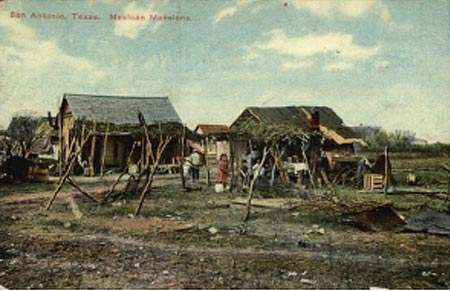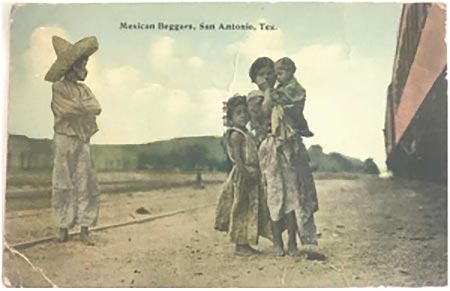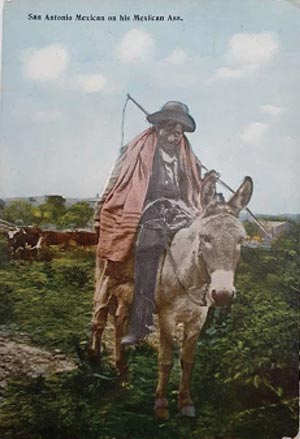Mendez honored for essay on 1900s racial influencing
/prod01/twu-cdn-pxl/media/images/esfl/sierramendez.jpg)
June 12, 2024 – DENTON – Sierra Mendez thought what she had written was important. After all, it got published. But she did not see this coming.
Mendez, an assistant professor of English and assistant director of First-Year Composition at TWU, wrote an essay about postcards from the early 1900s used to spread a narrative about San Antonio to racially segregate the community. It worked, she says, and in the hundred years since, that segregation remains.
She wasn't the only one to see the importance of the subject. Mendez was thrilled when "With Love from San Antonio: Settler Souvenir Postals and Mass Reproductions of ‘Mexicans,’" the first article she'd ever written, was published by Rhetoric Society Quarterly. She knew that all published articles were automatically entered into the journal's best-of-year contest, but an automatic entry is the kind of thing easily forgotten.
Then she got an email. She won. First time out, she won.
"Shock," Mendez said of her reaction. "I'm still in shock, I think. It's really exciting."
"With Love from San Antonio: Settler Souvenir Postals and Mass Reproductions of ‘Mexicans,’" earned the 2024 Charles Kneupper award for the best article published in Rhetoric Society Quarterly in 2023.
Rhetoric Society Quarterly is published by the Rhetoric Society of America, and features original articles on rhetorical studies, including theory, history, criticism and pedagogy. The journal addresses rhetoric scholars and students in the fields of communication and English study, philosophy, politics, and similar areas.
"Rhetoric Society Quarterly is one of the biggest journals for rhetoric," said Mendez, who earned her bachelor's degree from Texas A&M, a master's from North Texas, and a PhD in rhetoric from the University of Texas. "It's a difficult journal to be published in. I went through multiple rounds of revision for my article, and it was great. My reviewers and the editor who helped me with it were very invested in the project, so they were all awesome.
"They gave us a blurb about what the committee liked about the article," she said. "It's nice to see the project getting traction and that it's resonating at some level, that people are seeing how important it is.

"It's very satisfying, but the work is unfinished."
If you think influential marketing is a creation of the 21st century, think again.
According to the essay's description, Mendez "examines how settlers in San Antonio, at the turn of the twentieth century, used souvenir postal cards strategically to produce knowledge about their city and its place in the modern nation, to market it to White tourists and other settlers as a 'bordertown,' and to continue to dispossess and subordinate native Coahuiltecan, Tejano, and Mexican locals."
The topic is of more than academic interest to Mendez.

"It's a labor of love," she said. "My family has been in San Antonio a long time. I'm mixed race. Before I started my dissertation, I worked for the San Antonio public library in the archives, creating educational materials and community programming. My research started out trying to understand kind of a macro-level systemic forces that kind of shaped my family's history. But then it kind of turned into something else."
In those archives were postcards from the beginning of the 20th century that visitors sent to friends and family across the world from the home of one of America's biggest tourist attractions: the Alamo. But the postcards were not about the Alamo, and they were far more than the wish-you-were-here postcards found at most tourist attractions.
Among them were pictures of Mexican-American residents with captions like "Mexican beggars," "Mexicans out for fresh air," and "Mexican Peon Family." One showed a man on a donkey, captioned "San Antonio Mexican on his Mexican ass."

A number of postcards showed jacals, the rough grass and wood huts of many Hispanic residents, with captions like "A Mexican Mansion," and "Mexicans in front of their Palace."
Mendez argues those postcards were spreading carefully crafted narratives.
"The narratives the city told when it was creating itself and what that did to sort and categorize and structure bodies, and then it turned into something bigger because the postcards were a huge international phenomenon at the turn of the 20th century. You can use the postcards to trace coloniality of my journey across the western world."
Mendez says the narrative remains today.

"I don't think it's changed that much," she said. "San Antonio is one of the most economically segregated cities in the nation. The income discrepancy between bright bodies identified as white via census and bodies identified as Hispanic via census is more than $30,000. The life discrepancy between those same groups was around 30 years when COVID hit. San Antonio was one of the worst affected cities in the state. There's articles about why, and it's linked to San Antonio's Mexican-American population, which fulfills an overwhelming amount of the jobs that had to stay on during COVID. That had to keep working.
"A few years ago, I had a student from San Antonio, and we were looking at redlining maps across Texas," Mendez said. Redlining is withholding financial services from neighborhoods with predominant numbers of racial and ethnic minorities. "She came up to me after class and said San Antonio still looks like that."
Mendez's research on San Antonio's history and those postcards continues, and she plans to publish the full dissertation.
In the meantime, she's collaborating on another article tangential to her San Antonio project and creating a digital archive for those postcards so visitors see them and trace their circulation.
"What's really incredible is that these things are so complex and involved hundreds of people," Mendez said. "What the project shows is this widespread investment in these kinds of structures, from a very local to a very global trajectory. That's what decoloniality seeks to show."
Media Contact
David Pyke
Digital Content Manager
940-898-3668
dpyke@twu.edu
Page last updated 11:02 AM, June 12, 2024